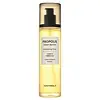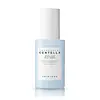What's inside
What's inside
 Key Ingredients
Key Ingredients

 Benefits
Benefits

 Ingredients Side-by-side
Ingredients Side-by-side

Propolis Extract 83%
Skin ConditioningGlycerin
Humectant1,2-Hexanediol
Skin ConditioningPropanediol
SolventNiacinamide
SmoothingDipropylene Glycol
HumectantCentella Asiatica Extract
CleansingPortulaca Oleracea Extract
Skin ConditioningPhellinus Linteus Extract
Skin ConditioningArctium Lappa Root Extract
Skin ConditioningScrophularia Buergeriana Extract
Skin ConditioningHoney Extract
HumectantSaccharomyces Ferment Filtrate
HumectantHedera Helix Leaf/Stem Extract
AntimicrobialVanilla Planifolia Fruit Extract
Skin ConditioningOcimum Sanctum Leaf Extract
Skin ConditioningCucumis Melo Fruit Extract
Skin ConditioningCamellia Sinensis Leaf Extract
AntimicrobialCorallina Officinalis Extract
Skin ConditioningLactobacillus Ferment Lysate
Skin ConditioningVitex Agnus-Castus Extract
AstringentChamomilla Recutita Flower Extract
MaskingAdenosine
Skin ConditioningMelia Azadirachta Leaf Extract
Skin ConditioningMelia Azadirachta Flower Extract
Skin ConditioningPyrus Communis Fruit Extract
Skin ConditioningPanthenol
Skin ConditioningCurcuma Longa Root Extract
Masking3-O-Ethyl Ascorbic Acid
Skin ConditioningRosa Damascena Flower Water
MaskingPrunus Persica Fruit Extract
AbrasiveSodium Hyaluronate
HumectantCetyl Ethylhexanoate
EmollientJasminum Officinale Flower Water
MaskingDextrin
AbsorbentTheobroma Cacao Extract
Skin ConditioningCaprylic/Capric Triglyceride
MaskingWater
Skin ConditioningVinyldimethicone
Polyglyceryl-4 Caprate
EmulsifyingPolyglyceryl-4 Oleate
EmulsifyingHydrogenated Lecithin
EmulsifyingXanthan Gum
EmulsifyingPhytosteryl/Octyldodecyl Lauroyl Glutamate
Skin ConditioningCeramide NP
Skin ConditioningBeta-Glucan
Skin ConditioningPropolis Extract 83%, Glycerin, 1,2-Hexanediol, Propanediol, Niacinamide, Dipropylene Glycol, Centella Asiatica Extract, Portulaca Oleracea Extract, Phellinus Linteus Extract, Arctium Lappa Root Extract, Scrophularia Buergeriana Extract, Honey Extract, Saccharomyces Ferment Filtrate, Hedera Helix Leaf/Stem Extract, Vanilla Planifolia Fruit Extract, Ocimum Sanctum Leaf Extract, Cucumis Melo Fruit Extract, Camellia Sinensis Leaf Extract, Corallina Officinalis Extract, Lactobacillus Ferment Lysate, Vitex Agnus-Castus Extract, Chamomilla Recutita Flower Extract, Adenosine, Melia Azadirachta Leaf Extract, Melia Azadirachta Flower Extract, Pyrus Communis Fruit Extract, Panthenol, Curcuma Longa Root Extract, 3-O-Ethyl Ascorbic Acid, Rosa Damascena Flower Water, Prunus Persica Fruit Extract, Sodium Hyaluronate, Cetyl Ethylhexanoate, Jasminum Officinale Flower Water, Dextrin, Theobroma Cacao Extract, Caprylic/Capric Triglyceride, Water, Vinyldimethicone, Polyglyceryl-4 Caprate, Polyglyceryl-4 Oleate, Hydrogenated Lecithin, Xanthan Gum, Phytosteryl/Octyldodecyl Lauroyl Glutamate, Ceramide NP, Beta-Glucan
Water
Skin ConditioningCentella Asiatica Leaf Water 38%
Skin ConditioningButylene Glycol
Humectant1,2-Hexanediol
Skin ConditioningNiacinamide
SmoothingGlycerin
HumectantPantolactone
HumectantHibiscus Esculentus Fruit Extract
Skin ConditioningSodium Hyaluronate
HumectantHydrolyzed Hyaluronic Acid
HumectantHyaluronic Acid
HumectantMethylpropanediol
SolventPanthenol
Skin ConditioningCetearyl Olivate
Carbomer
Emulsion StabilisingArginine
MaskingSorbitan Olivate
EmulsifyingCaprylic/Capric Triglyceride
MaskingPyrus Communis Fruit Extract
Skin ConditioningPentylene Glycol
Skin ConditioningAdenosine
Skin ConditioningPolyglutamic Acid
Skin ConditioningRosa Damascena Flower Water
MaskingArtemisia Princeps Leaf Extract
Skin ConditioningCucumis Melo Fruit Extract
Skin ConditioningIris Florentina Root Extract
MaskingEthylhexylglycerin
Skin ConditioningHedera Helix Leaf/Stem Extract
AntimicrobialSodium Phytate
Xanthan Gum
EmulsifyingMaltodextrin
AbsorbentHydrolyzed Gardenia Florida Extract
AntioxidantHydrogenated Lecithin
EmulsifyingCeramide NP
Skin ConditioningSodium Hyaluronate Crosspolymer
HumectantHydrolyzed Sodium Hyaluronate
Skin ConditioningWater, Centella Asiatica Leaf Water 38%, Butylene Glycol, 1,2-Hexanediol, Niacinamide, Glycerin, Pantolactone, Hibiscus Esculentus Fruit Extract, Sodium Hyaluronate, Hydrolyzed Hyaluronic Acid, Hyaluronic Acid, Methylpropanediol, Panthenol, Cetearyl Olivate, Carbomer, Arginine, Sorbitan Olivate, Caprylic/Capric Triglyceride, Pyrus Communis Fruit Extract, Pentylene Glycol, Adenosine, Polyglutamic Acid, Rosa Damascena Flower Water, Artemisia Princeps Leaf Extract, Cucumis Melo Fruit Extract, Iris Florentina Root Extract, Ethylhexylglycerin, Hedera Helix Leaf/Stem Extract, Sodium Phytate, Xanthan Gum, Maltodextrin, Hydrolyzed Gardenia Florida Extract, Hydrogenated Lecithin, Ceramide NP, Sodium Hyaluronate Crosspolymer, Hydrolyzed Sodium Hyaluronate
 Reviews
Reviews

Ingredients Explained
These ingredients are found in both products.
Ingredients higher up in an ingredient list are typically present in a larger amount.
1,2-Hexanediol is a synthetic liquid and another multi-functional powerhouse.
It is a:
- Humectant, drawing moisture into the skin
- Emollient, helping to soften skin
- Solvent, dispersing and stabilizing formulas
- Preservative booster, enhancing the antimicrobial activity of other preservatives
Adenosine is in every living organism. It is one of four components in nucleic acids that helps store our DNA.
Adenosine has many benefits when used. These benefits include hydrating the skin, smoothing skin, and reducing wrinkles. Once applied, adenosine increases collagen production. It also helps with improving firmness and tissue repair.
Studies have found adenosine may also help with wound healing.
In skincare products, Adenosine is usually derived from yeast.
Learn more about AdenosineThis ingredient is an emollient, solvent, and texture enhancer. It is considered a skin-softener by helping the skin prevent moisture loss.
It helps thicken a product's formula and makes it easier to spread by dissolving clumping compounds.
Caprylic Triglyceride is made by combining glycerin with coconut oil, forming a clear liquid.
While there is an assumption Caprylic Triglyceride can clog pores due to it being derived from coconut oil, there is no research supporting this.
Learn more about Caprylic/Capric TriglycerideCeramide NP is a type of ceramide and formally known as ceramide 3.
Ceramides are intercellular lipids naturally found in our skin that bonds dead skin cells together to create a barrier. They are known for their ability to hold water and thus are a great ingredient for dry skin.
Ceramides are an important building block for our skin barrier. A stronger barrier helps the skin look more firm and hydrated. By bolstering the skin ceramides act as a barrier against irritating ingredients. This can help with inflammation as well.
If you would like to eat ceramides, sweet potatoes contain a small amount.
Read more about other common types of ceramides here:
Ceramide AP
Ceramide EOP
We don't have a description for Cucumis Melo Fruit Extract yet.
Glycerin is already naturally found in your skin. It helps moisturize and protect your skin.
A study from 2016 found glycerin to be more effective as a humectant than AHAs and hyaluronic acid.
As a humectant, it helps the skin stay hydrated by pulling moisture to your skin. The low molecular weight of glycerin allows it to pull moisture into the deeper layers of your skin.
Hydrated skin improves your skin barrier; Your skin barrier helps protect against irritants and bacteria.
Glycerin has also been found to have antimicrobial and antiviral properties. Due to these properties, glycerin is often used in wound and burn treatments.
In cosmetics, glycerin is usually derived from plants such as soybean or palm. However, it can also be sourced from animals, such as tallow or animal fat.
This ingredient is organic, colorless, odorless, and non-toxic.
Glycerin is the name for this ingredient in American English. British English uses Glycerol/Glycerine.
Learn more about GlycerinWe don't have a description for Hedera Helix Leaf/Stem Extract yet.
Hydrogenated Lecithin is created from the hydrogenation of lecithin (a group of phospholipids). Hydrogenation is a chemical reaction between hydrogen and another element.
This ingredient is an emollient and emulsifier. As an emollient, it helps soften skin by trapping moisture within. As an emulsifier, it prevents oil and water ingredients from separating.
Niacinamide is a multitasking form of vitamin B3 that strengthens the skin barrier, reduces pores and dark spots, regulates oil, and improves signs of aging.
And the best part? It's gentle and well-tolerated by most skin types, including sensitive and reactive skin.
You might have heard of "niacin flush", or the reddening of skin that causes itchiness. Niacinamide has not been found to cause this.
In very rare cases, some individuals may not be able to tolerate niacinamide at all or experience an allergic reaction to it.
If you are experiencing flaking, irritation, and dryness with this ingredient, be sure to double check all your products as this ingredient can be found in all categories of skincare.
When incorporating niacinamide into your routine, look out for concentration amounts. Typically, 5% niacinamide provides benefits such as fading dark spots. However, if you have sensitive skin, it is better to begin with a smaller concentration.
When you apply niacinamide to your skin, your body converts it into nicotinamide adenine dinucleotide (NAD). NAD is an essential coenzyme that is already found in your cells as "fuel" and powers countless biological processes.
In your skin, NAD helps repair cell damage, produce new healthy cells, support collagen production, strengthen the skin barrier, and fight environmental stressors (like UV and pollution).
Our natural NAD levels start to decline with age, leading to slower skin repair, visible aging, and a weaker skin barrier. By providing your skin niacinamide, you're recharging your skin's NAD levels. This leads to stronger, healthier, and younger looking skin.
Another name for vitamin B3 is nicotinamide. This vitamin is water-soluble and our bodies don't store it. We obtain Vitamin B3 from either food or skincare. Meat, fish, wheat, yeast, and leafy greens contain vitamin B3.
The type of niacinamide used in skincare is synthetically created.
Learn more about NiacinamidePanthenol is a common ingredient that helps hydrate and soothe the skin. It is found naturally in our skin and hair.
There are two forms of panthenol: D and L.
D-panthenol is also known as dexpanthenol. Most cosmetics use dexpanthenol or a mixture of D and L-panthenol.
Panthenol is famous due to its ability to go deeper into the skin's layers. Using this ingredient has numerous pros (and no cons):
Like hyaluronic acid, panthenol is a humectant. Humectants are able to bind and hold large amounts of water to keep skin hydrated.
This ingredient works well for wound healing. It works by increasing tissue in the wound and helps close open wounds.
Once oxidized, panthenol converts to pantothenic acid. Panthothenic acid is found in all living cells.
This ingredient is also referred to as pro-vitamin B5.
Learn more about PanthenolWe don't have a description for Pyrus Communis Fruit Extract yet.
Rosa Damascena Flower Water comes from the Damask rose. It is a dilluted version of the Rose Essential oil.
The Damask Roses' petals have antioxidant, antimicrobial, and fragrance compounds. Though antioxidants are great for soothing skin, the fragrance compounds can irritate it.
Sodium Hyaluronate is hyaluronic acid's salt form. It is commonly derived from the sodium salt of hyaluronic acid.
Like hyaluronic acid, it is great at holding water and acts as a humectant. This makes it a great skin hydrating ingredient.
Sodium Hyaluronate is naturally occurring in our bodies and is mostly found in eye fluid and joints.
These are some other common types of Hyaluronic Acid:
Learn more about Sodium HyaluronateWater. It's the most common cosmetic ingredient of all. You'll usually see it at the top of ingredient lists, meaning that it makes up the largest part of the product.
So why is it so popular? Water most often acts as a solvent - this means that it helps dissolve other ingredients into the formulation.
You'll also recognize water as that liquid we all need to stay alive. If you see this, drink a glass of water. Stay hydrated!
Learn more about WaterXanthan gum is used as a stabilizer and thickener within cosmetic products. It helps give products a sticky, thick feeling - preventing them from being too runny.
On the technical side of things, xanthan gum is a polysaccharide - a combination consisting of multiple sugar molecules bonded together.
Xanthan gum is a pretty common and great ingredient. It is a natural, non-toxic, non-irritating ingredient that is also commonly used in food products.
Learn more about Xanthan Gum